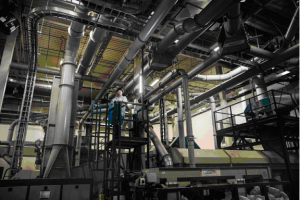Construction of the Critical Medicines Production Centre (CMPC) in the Edmonton Research Park is well underway. The exterior shell is almost complete and equipment installation is anticipated to be completed by the end of the year, and full operations to commence in 2026.
When opened the CMPC will position the city as a leading hub for life sciences in Canada. In addition to end-to-end drug development the new centre will also provide infrastructure for researchers and companies to bring new therapies to market.
The Alberta oilsands are considered either a blessing or curse by various individuals and/or groups around the globe. Many who side with a climate change agenda consider the oilsands as a blight on and/or threat to the planet. Those who think well of the oilsands see the vast potential for what is the largest oil reserve on the planet. Although it is being done, the process of converting the bitumen contained in the oilsands to fuel is difficult, energy-intensive and expensive. For that reason, Alberta is focusing upon and investing in research and development to convert material in Alberta’s oilsands into non-fuel products, including asphalt, activated carbon, carbon nanotubes, polyurethanes, and controlled-release fertilizers.
Applied Pharmaceutical Innovation broke ground for a new 83,000 sq.foot Critical Medicines Production Centre In June. This new Production Centre will nearly double API’s footprint in Edmonton when complete in 2026. The plant will be able to produce more than 70 million doses of a vaccine, drug, or treatment yearly and can increase supply-chain security for common drugs.
API has received $80.5 million from the federal government and $17.6 million from the province to build the facility.The production facility is a collaboration between API and the University of Alberta’s Li Ka Shing Applied Virology Institute which partly funded by the $200-million Canadian Critical Drug Initiative.



